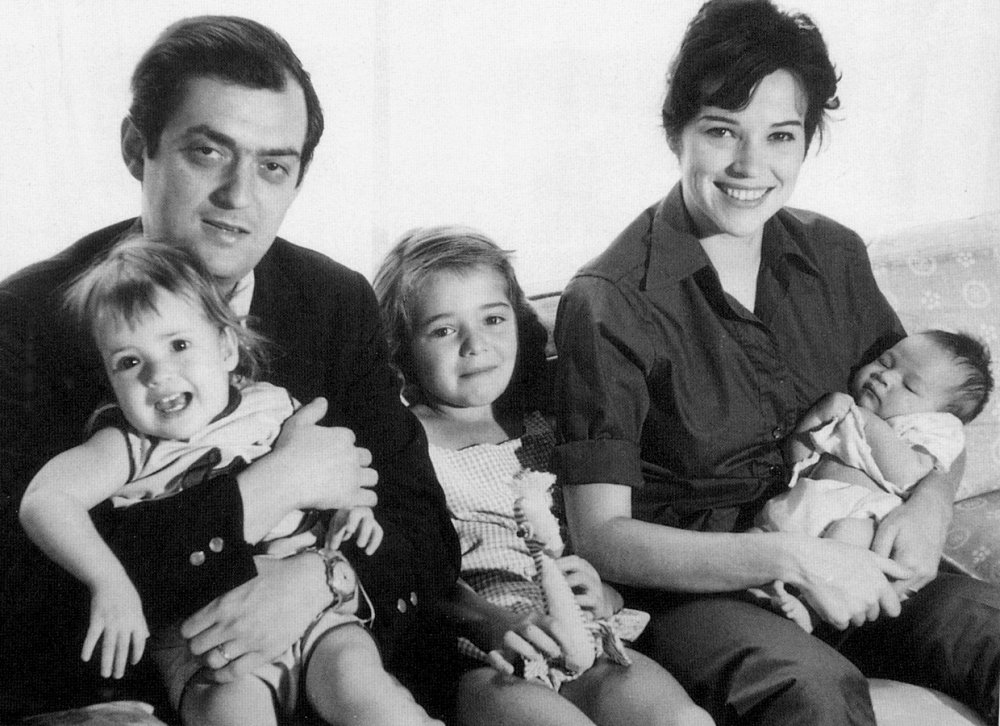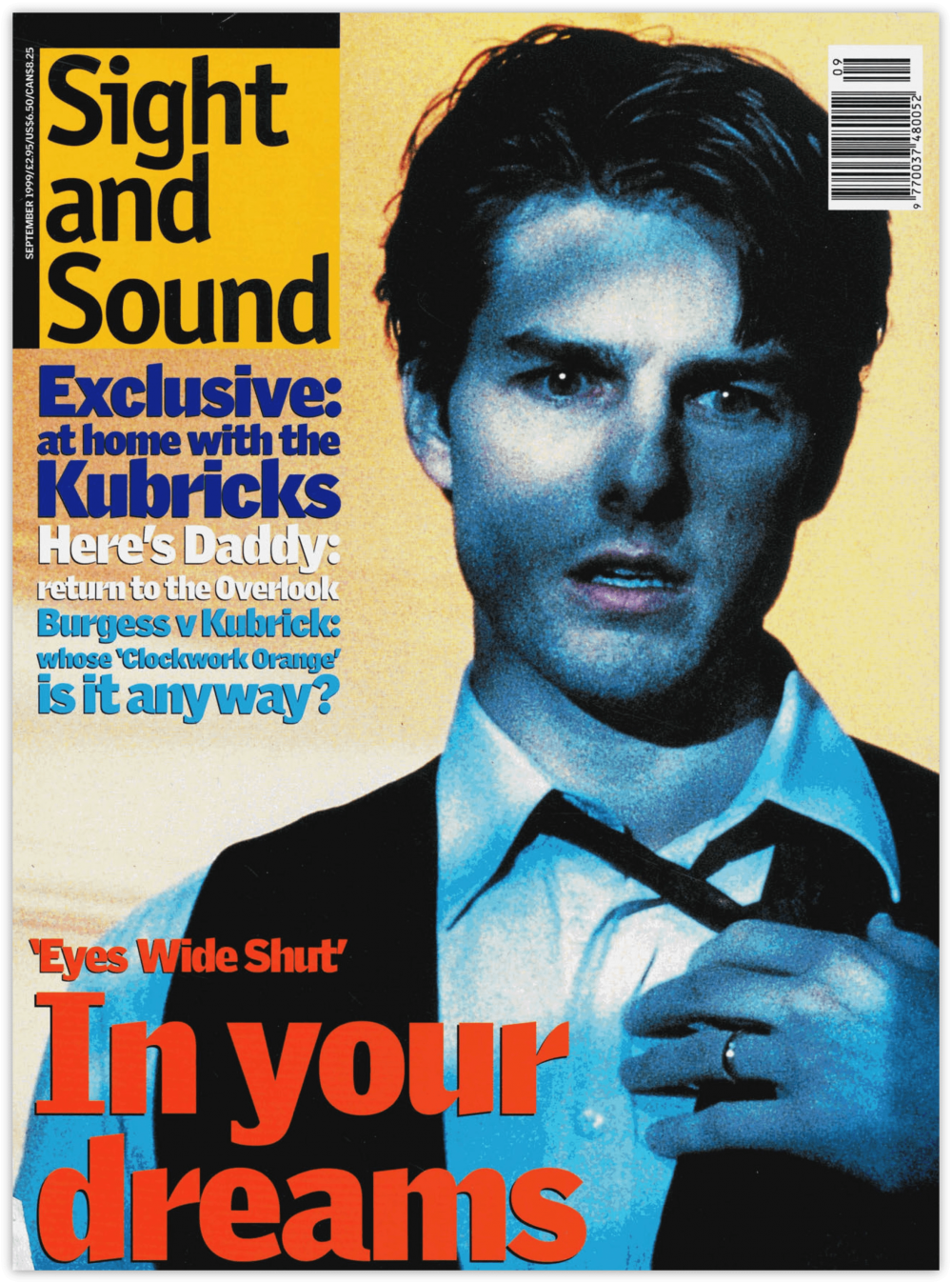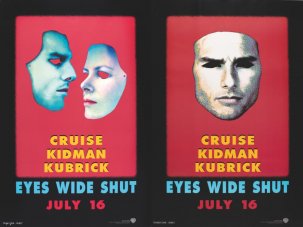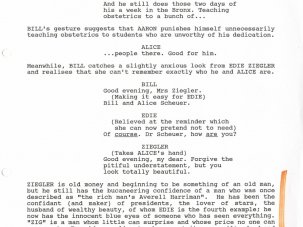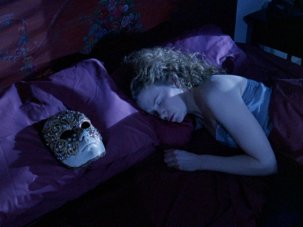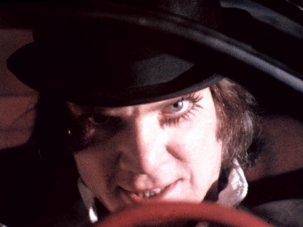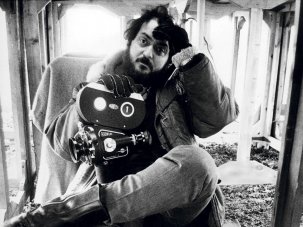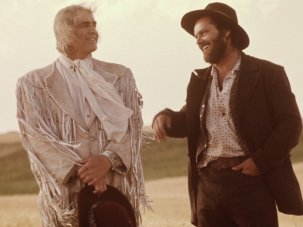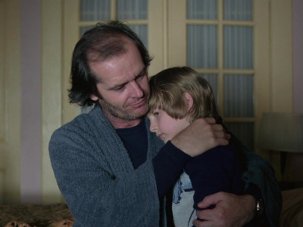If you’ve read any accounts of a trip to the home of the late Stanley Kubrick, you will know that tone usually adopted by the writer is a mixture of trepidation, excitement and paranoia. As an introduction to meeting the supposed ‘recluse’ of legend, it is deemed essential there should be a touch of Kafka about the descriptive build-up – don’t leave out the sleeping policemen or the series of electronic gates.
Arriving under more sombre circumstances, invited just a few months after Kubrick’s death to interview his wife Christiane and two of his three daughters, Anya and Katharina, I gained a contrary impression. The house in brilliant sunshine seemed a freewheeling sort of place, suddenly afflicted with sadness. In the Kubricks’ company, sitting in a large, airy study room decorated at one end with Eyes Wide Shut poster artwork, open debate seemed the norm. Though I was determined not to try to play chess with a ghost, the challenging spirit of enquiry Stanley Kubrick was known for seemed ever-present.
This made it a little easier for me to put many of the unpleasant things that have been said about Kubrick before his kith and kin. Christiane is a painter, as is Katharina (examples of both their work are used as decoration in Eyes Wide Shut), who is married to film location manager Philip Hobbs and has three sons. Anya runs her own opera company, Palace Opera, is married to conductor and opera singer Jonathan Finney and has one son. The Kubricks agreed to talk to Sight and Sound because it is a journal of record. Much of what has been said about Kubrick over the years and in the aftermath of his death has angered them. In particular they believe that some of the literature on Kubrick – such as Stanley Kubrick: a Biography by John Baxter and Eyes Wide Open: A Memoir of Stanley Kubrick by Frederic Raphael – gives a mistaken impression of him.
Nick James: How was Stanley Kubrick as a father and family man?
Katharina: He could easily have sent us off to boarding school, but instead we had tutors and goodness knows who else travelling with us. We had an incredibly interesting childhood and he was interested in almost every aspect of our lives. He was a bit strict with his oldest daughter (me) about parties, but it was the 60s. I now have a 14-year-old boy who’s scaring the life out of me, so not only do I understand why he was strict – although I resented it bitterly at the time – I also think he probably wasn’t strict enough. It was obviously a very artistic milieu.
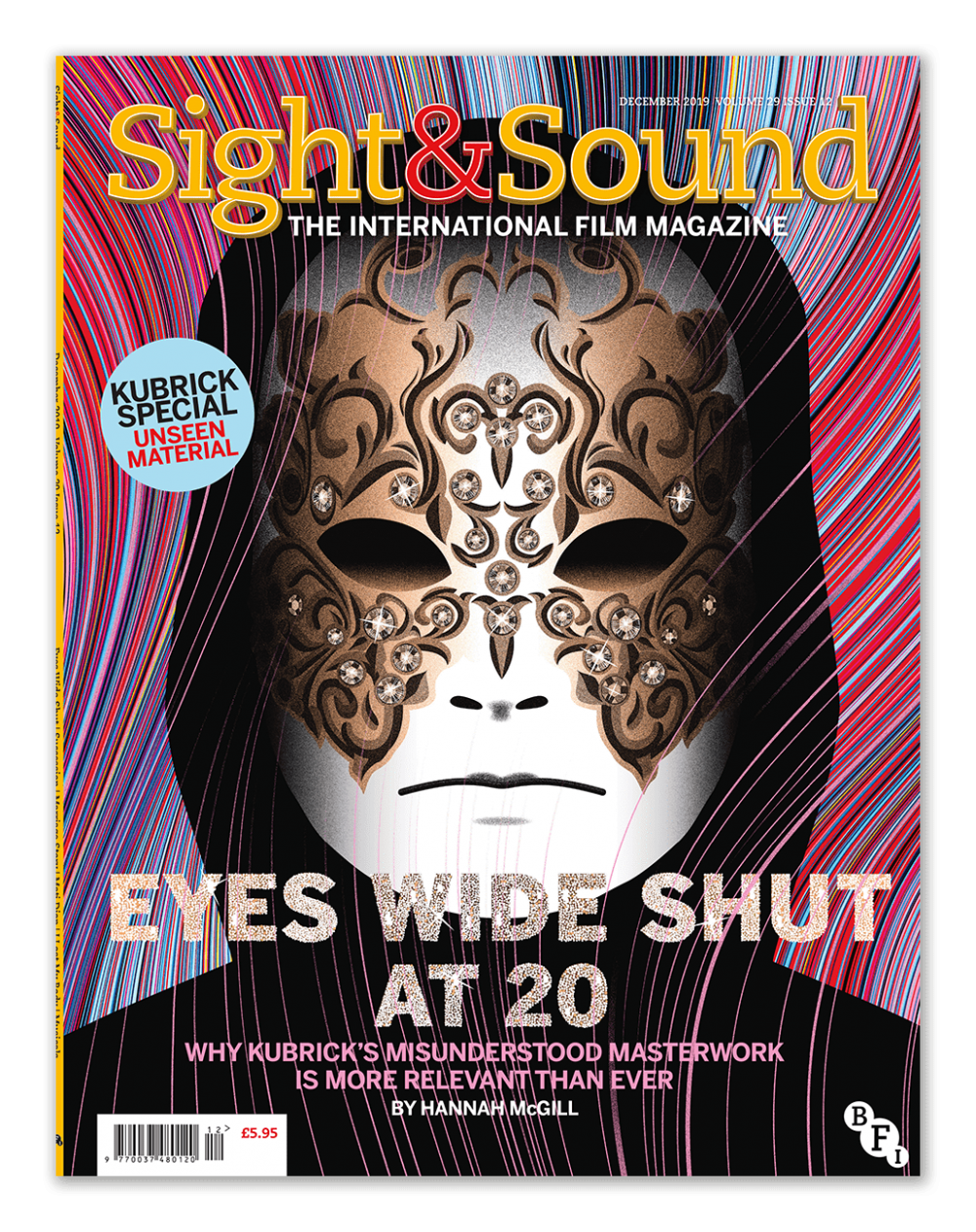
Get our December 2019 issue, revisiting Eyes Wide Shut and talking to Kubrick’s family and colleagues 20 years later.
Eyes Wide Shut is re-released for its 20th anniversary on 29 November 2019.
How much was he involved in passing on his sense of culture to you?
Anya: He always worked at home as much as he could and my mother, who is a painter, was also working at home. So there were basic visual and musical languages around. The result is we’re all visually well trained. Each of us is a reasonable photographer, and even I can sort of draw.
Katharina: We saw an awful lot of movies, probably more than most people because there were regular screenings. I was a great movie buff when I was at art college. Music, art and film were the predominant themes of our lives.
How did he respond to your curiosity about his work?
Anya: We didn’t need to be curious because it was always there. He was really happy for us to go on the set, though it would depend on what he was shooting. If we arrived at 3am and they were doing something deemed unsuitable for children, it would be an intrusion. But otherwise I always felt I could go and see him.
Katharina: He was very open. He would often ask us into his office when he was listening to a piece of music and he’d say, “What do you think, do you like it by this conductor?”, and then he’d put on another conductor’s version. And he would be interested in what we thought of the movies. Films like A Clockwork Orange we weren’t allowed to see until we were of age. I didn’t see Lolita until I was 16. So he was very correct in that way. We’d have movies at weekends – we saw every Elvis Presley and Cliff Richard movie, and then Mum and Dad and friends would watch something grown-up. Occasionally I would sneak into the projection room and look through the window and be scared to death and run out again.
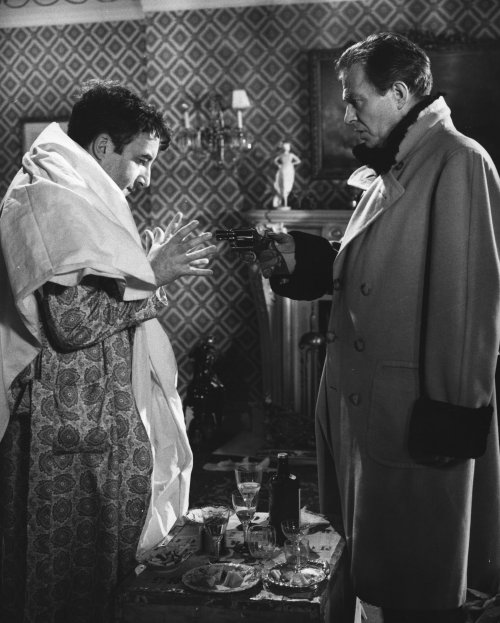
Lolita (1962)
How did he compare to other people’s fathers?
Anya: He wasn’t a remarkable father. He was a remarkable filmmaker. He was a very nice, good, rather Jewish father – probably over-protective but no more so than many. He would always be there for us and he was fantastic in a crisis. He could be impatient with you if he thought you weren’t dealing with things properly, but if you fell, he was there. Even if he was in the middle of God-knows-what work schedule, if you phoned and said, “I have to speak to you, I’ve really got a problem”, he would do it.
Katharina: He was a bottom-line kind of guy. Between the two of them, my mother and father covered just about everything – there wasn’t an emotional crisis or a career decision or a legal thing that was done alone. We would always sit down at the dinner table and hack things out.
A debate?
Katharina: Absolutely. And what Daddy didn’t know about female workings was not worth knowing. Yet people say he was a misogynist and he didn’t know about women… Another thing that really got me was when someone criticised the order in which Stanley ate his food – you know sometimes when you get a lot of delicious food and you sample a bit before you begin? There was some guy on the television criticising him for it.
Christiane: Malcolm McDowell, actually.
Katharina: I wasn’t going to say that.
Christiane: I don’t care.
Katharina: I was very upset about that because it’s so small-minded and trivial.
Anya: It’s very easy to make any body’s behaviour sound odd. You take anyone doing anything out of context and it sounds peculiar.
It’s reckoned to be a hard thing for two creative artists to live together. What made it possible for you?
Christiane: We were suited in that I could paint at home and he could do most of the preparation and editing at home – the filming part would take relatively little time. And painters are sitting ducks for conversation, so I was a good sounding board. I could be found very easily.
Were you found often?
Christiane: It depends. Had he been alive and around now when all this publicity and coverage are going on, we would have done this together. I’ve had death in the family, my parents. I had a mother with Alzheimer’s, which is the ultimate catastrophe.
Did she move in with you?
Christiane: For short periods. In the end she was in an institution in Germany. During the almost 14 years that she was ill, I really needed Stanley. It’s the ultimate test and he was spectacular with that. He was endlessly on the phone to get another test and another doctor. We were very practical people.
Anya: You could always interrupt him. He wouldn’t want you to interrupt him for any old thing, but if you had a reason you could go in, especially when we were young. He could just multi-task – deal with what you needed and what the firm wanted and what the thing in front of him needed and then another person came in… He was very good at switching topics without going, “What’s this?”
Katharina: He would say, “What do you want?” And you knew that he was paying attention. But you also knew that the moment the door was closed he was straight back on line dealing with whatever he was dealing with.
Christiane: You’d get the occasional, “Get to the point.”
Katharina: Our lives as children were certainly like: “Dinner’s ready, no Daddy’s on the phone, he’ll be down in a minute.” But that was because most dinner times he was talking to LA. He needed to talk to the world. Somebody said that before there was an internet he was the internet.
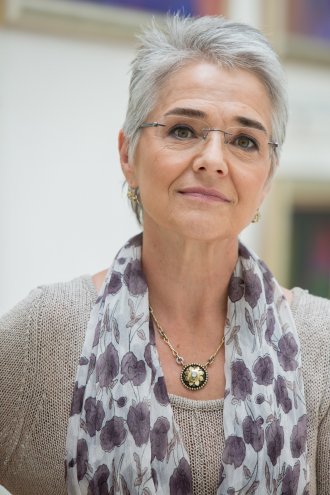
Katharina Kubrick
Is it true that he slept at odd times to be able to work US office hours?
Christiane: According to his parents, he was always a night owl because he didn’t need much sleep. He would work an ordinary day and then he could add the Californian office hours, so California had the impression he never slept. When he was young he got by on four to five hours’ sleep; when he got older it was a little more than five, but still less than most people.
What about his reputation as a recluse, that he didn’t leave the house?
Anya: It’s exaggerated.
Christiane: He didn’t leave a lot. He did far fewer restaurants and parties than other people, that’s true. We gave a lot of parties when we were young, and then when we were old, not so many. But I look at other couples and it’s the same. Since we’re lucky to have this big house, we didn’t need to go anywhere. Everybody came to him. Those who didn’t come, he could phone. And he liked it here.
Katharina: He had the best of being famous in that his work was famous, his name was famous, but his face was not. So he could go into St Albans, go into M&S and Waitrose or go into bookshops, do what he wanted and nobody would pay him any mind.
He did do that?
Katharina: Absolutely. Because there are people who think he never went anywhere.
Anya: People think he never left his bedroom.
Katharina: One day he came back from M&S and said, “Someone recognised me. I didn’t know what to do and they asked me for my autograph.” He was very surprised.
Anya: But it didn’t happen very often.
Katharina: No. So that was great. Very famous people can’t leave their homes.
Christiane: Tom Cruise is literally a prisoner of the Midas touch. He can’t go anywhere.
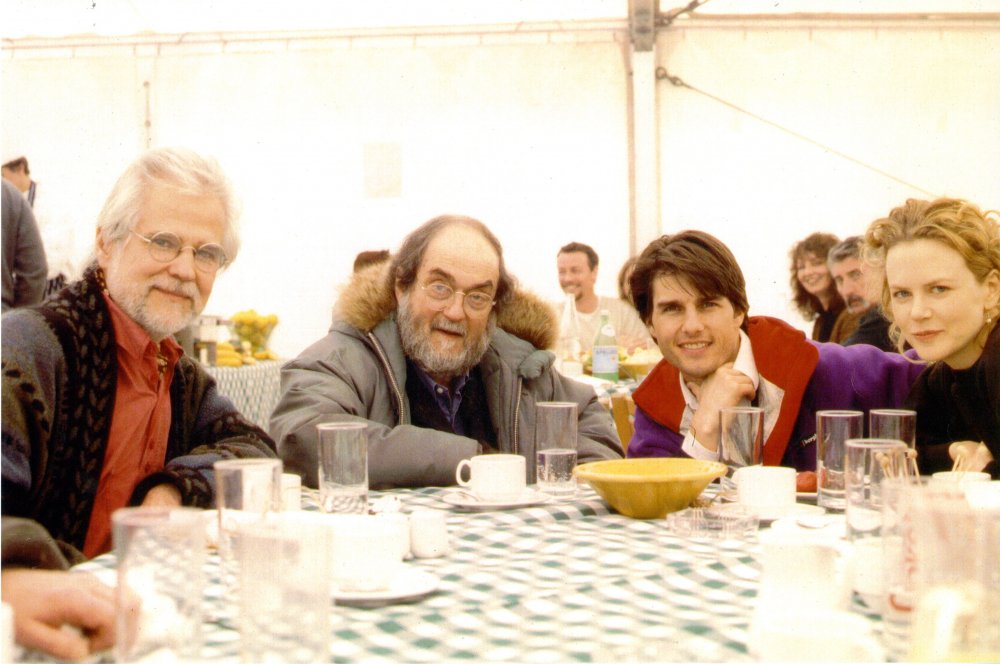
Stanley Kubrick with producer Jan Harlan, Tom Cruise and Nicole Kidman during production of Eyes Wide Shut (1999)
Credit: Warner Bros Pictures
Is that true even in the UK?
Katharina: There’s a scene in Eyes Wide Shut where Tom had to walk into a hospital – this was in London. Word got round, and within half an hour the police were having to put up cordons and people kept ruining the shot by shouting, “Tom, I love you.”
Christiane: Stanley watched it from the car and said it was just terrifying.
Anya: Presumably Tom Cruise is used to it, but you must feel you’re under attack.
Christiane: As to being accused of a peculiar and demonic household, everyone who comes here from Hollywood says, “This is it. I want to live like this instead of travelling everywhere.” Stanley had the great luxury of not having to be a performer and he earned that by the very thing he’s also accused of – that he didn’t make very many films. He thought very long and hard and really worried and looked at billions of stories and rejected many and was quite sad that he couldn’t make more. But the reason he didn’t make more is that he was so very careful, which earned him the freedom from Warner Bros. It was hard-worked-for, but they left him alone and they never interfered because they didn’t have to. They knew he wasn’t going to be childish about anything.
I had assumed that the dark myth of Stanley Kubrick would have had a big impact on your lives.
Christiane: Only now. He was a big umbrella. I’m just sticking my nose into all this for the first time.
Katharina: Occasionally I would say, “Why don’t you say something? You can’t let people say that.” He’d say, “What am I gonna do? I start doing that and then every time somebody says something I’ll have to go out there, and it’s so time consuming.” He wasn’t going to lower himself to that level: “No, I don’t do that. No, I don’t shoot people from my garden.”
Christiane: “I don’t drive at 30 miles an hour and I’m not a nerd.” You find yourself saying all these things.
Was there one particular event that cemented this sinister image?
Christiane: It was an accumulation of made-up stories. It’s the press cuttings – everyone who’s given a piece to write goes there and repeats the last thing written, like the eternally really stupid photo of Stanley sucking on a cigar. Once he hurt his back and couldn’t move so he drove at 30 miles an hour because he should have been in bed. Also, his parents lived in New Jersey where every window has a bug screen. So he arrives in England and says, ‘‘Aren’t there any screens on the windows?” The next thing you hear is he sprays his garden with a helicopter.
Let’s recount some of the things said about Stanley Kubrick – that he never took vacations!
Christiane: “From what?”, he asked. He didn’t go on an official holiday because he had his own timetable. For him the thought of sitting somewhere on a beach without all his books and gadgets was a total nightmare. He really didn’t understand why people did that. Most people want a vacation because they can’t stand what they’re doing another week.
Katharina: When I was 19 and didn’t know what I wanted to do with my life he told me, “The luckiest people in the world get to do for a living what they would do as a hobby.”
What about holidays when you were children?
Christiane: I took them to Cornwall and Norfolk, though not for very long or very often. And we did of course have one year in Ireland, which was one big camping trip.
Katharina: And we went backwards and forwards to America all the time by ship. We went on the Queen Mary, the Queen Elizabeth, the SS United States and the SS France, a week of ice-cream and lying on the deck. It was glorious.
Christiane: He enjoyed that – pretending to be living in 1930. Once you reach the time of life when you don’t have financial worries so much – which wasn’t always the case – then you can decide whichever kind of life you like better. That’s why he didn’t read those books about him. He had the discipline to know it would bother him.
So he didn’t read any of the biographies?
Christiane: No. We didn’t help by saying, “You ought to read this. This is really nasty, you’ll love this one.” In the end, he minded about that.
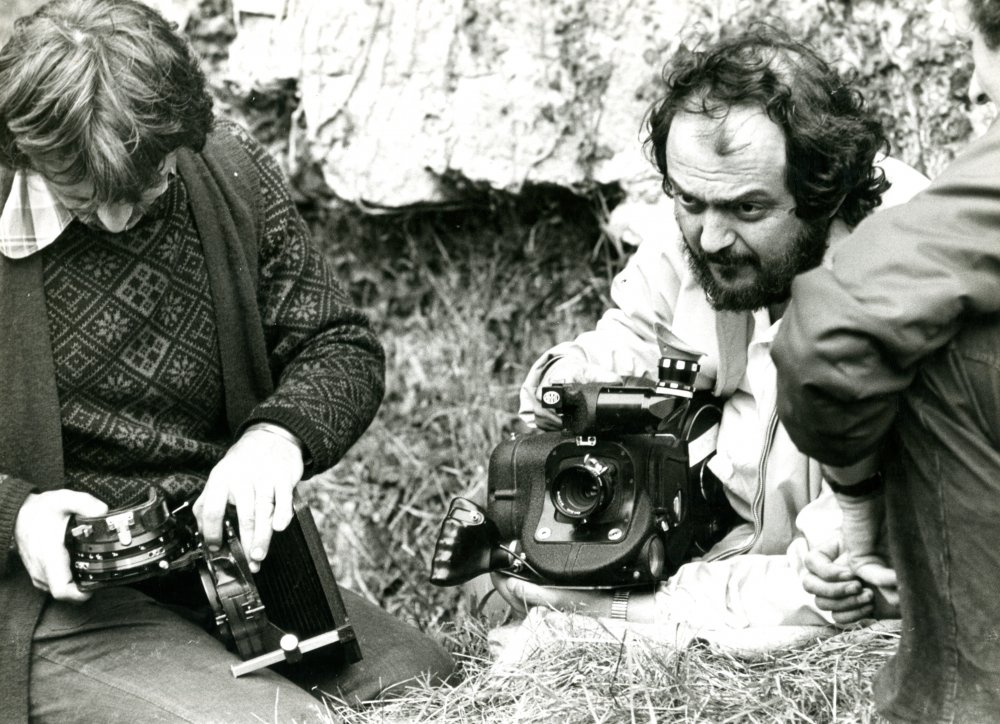
Barry Lyndon (1975)
Credit: With thanks to the SK Film Archives LLC, Warner Bros. and University of the Arts London
The IRA threatened to kill him during the filming of Barry Lyndon!
Christiane: They did. Two men arrived with ladders and house-painting gear at our house, which was rented, and the woman who cooked for us said, “I know these lads. They’re not painters.” A day later they came to the studio and told Stanley and Ryan O’Neal they wanted us out of the country immediately. You couldn’t see us for dust – I don’t think that’s paranoia!
He downplayed his Jewishness!
Katharina: He wasn’t religious, but he absolutely did not do that.
He was a passive-aggressive manipulator!
Anya: He certainly wasn’t passive-aggressive, and he was not a manipulator. He was a negotiator of the first order. He argued his point and often won. He knew what he wanted and he knew how to express it. As a conversational experience he enjoyed provoking people and he would deliberately figure out what someone’s opinions were – their politics, what was going to rile them – and then say something to get a reaction, to get a discussion going. He was a debater. Whether it was a negotiation about something he was trying to get done or he was trying to persuade us to change our minds, he argued hard. Manipulate has the idea that he was pulling strings, being sneaky. He was not sneaky; he was direct.
Christiane: You can’t make films if people hate you. There will always be one or two who like you less but…
Anya: The point was to get things right. So if he felt someone was in error, he would make his point. But people are often upset by being found out. He was a challenge – he thought you should know what you were doing, what you thought about something, why you thought it, why you were doing it, that you should have thought it through.
Christiane: Yet he was always the first – especially in artistic terms – to throw up his hands and say, ‘‘I’m talking crap.” He would stop himself in the middle and say, “Never have I said such rubbish!” and immediately redress everything.
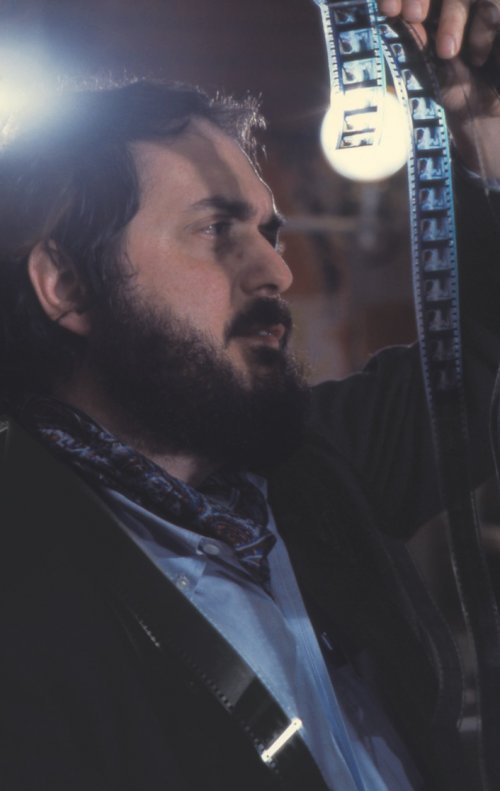
Stanley Kubrick
He had no sense of humour!
Anya: He had the best jokes.
Christiane: He had a devastating dry wit, and it’s what I now miss the most. He was incredibly funny.
Katharina: If something struck him as very funny, he’d laugh very hard.
Christiane: That’s why the accusations hurt now. When he was alive, I really didn’t care, but now when I hear people say these totally idiotic things, I become angry.
He couldn’t talk to women! (This is from a quote by Adrienne Corri in John Baxter’s biography.)
Christiane: Couldn’t talk to Adrienne Corri, maybe.
Katharina: And you don’t know how she was expecting to be spoken to. You don’t know what her agenda was either.
Anya: Or whether she even said it.
Christiane: This is also true. We may be angry with people who never said those things.
Katharina: Anya said that the more she reads about Daddy the more she thinks that Howard Hughes was probably a perfectly normal person.
Which of the books is most unreliable?
Christiane: The Baxter and the Raphael.
Katharina: There are weird accuracies in Vincent LoBrutto’s biography Stanley Kubrick like the date I got married and how many children I have, and because those things are true the reader will then assume everything else is true.
Christiane: Stanley sued Punch and won and then they lied. When they said that they had won they were actually thrown out of court.
Katharina: In May, after Stanley died, Punch wrote that he went out into the garden and shot some picnickers and then gave the picnickers loads of money that he just happened to have around his person so they wouldn’t say anything. It must be said that no other newspaper anywhere picked it up – even they thought it was too much.
Anya: Not only is it more painful for us now, because he’s not here to say “Don’t worry about it”, but he was starting to worry about it, and minding the maliciousness and inaccuracy.
You promised to reveal the truth on your website.
Christiane: Shortly after the funeral a few things happened that made me think I ought to have a website so I could immediately write back, but then Warners and Rick Senat said, “Be very careful, you’ll reap the whirlwind if you do that”, and I said, “I haven’t said anything yet, but I will.” I would have been very stupid to blurt out any and every indignation I felt and they quite correctly warned me not to do it. So I’ve been telling nice stories about Stanley, which is the only way to counter the allegations. Also, I don’t want to join the mudslingers. Stanley was amazingly tolerant in taking the most extraordinary abuse. It takes strength to do that. A lot of the people who have said outrageous things have hurt themselves more than Stanley.
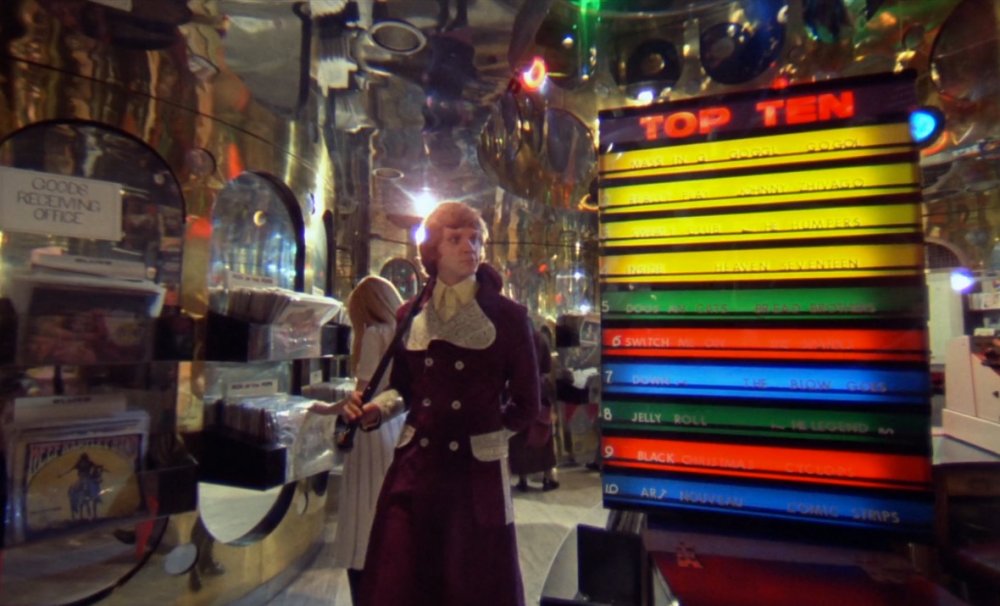
A Clockwork Orange (1971)
Is it worse being on the doorstep of the UK press?
Christiane: Finally, he thought so, because in America, France, Italy and all over Europe he was treated with much more respect. It’s only in England that there’s this envious, strange joy in knocking him off his pedestal – even if he himself never climbed on to one. Because A Clockwork Orange played with the background of England, they blamed every crime in history on Stanley’s film. That was a very sloppy conclusion; he felt very hurt and misunderstood. That only happened here, nowhere else.
Anya: He never answered back. After a while it became obvious you could say just about anything and he wasn’t going to retaliate.
So he wasn’t litigious?
Anya: Only when absolutely forced. They saw A Clockwork Orange and they didn’t get the point. So there was no point in saying anything.
Christiane: He thought he had explained what he meant thoroughly in the film.
Anya: I don’t believe the general public didn’t understand A Clockwork Orange. But there was a concentrated group of journalists who spotted a way to spin a story. Instead of “Thug Beats Up Old Lady”, it was “Clockwork Thug Beats Up Old Lady”. Thug was going to beat up old lady anyway, and you’re going to report it anyway, but now you get to call him a Clockwork Thug.
☞ The raucous perfection of Stanley Kubrick’s A Clockwork Orange
Did he try to use his image for his own purposes? After all, the making of cinema is about the making of myth. Supposing you’re saddled with this image and there’s a way you can turn it around for your own ends?
Christiane: He wished.
Katharina: He certainly knew that if he wanted to call the head of a company on the other side of the world, once they had established it was really him, then of course his name would get him through to talk to the boss.
Anya: But that’s a function of fame, not mythology. One of the useful tools of his success was that people wanted to help him. I’m sure Steven Spielberg gets anyone he wants on the phone.
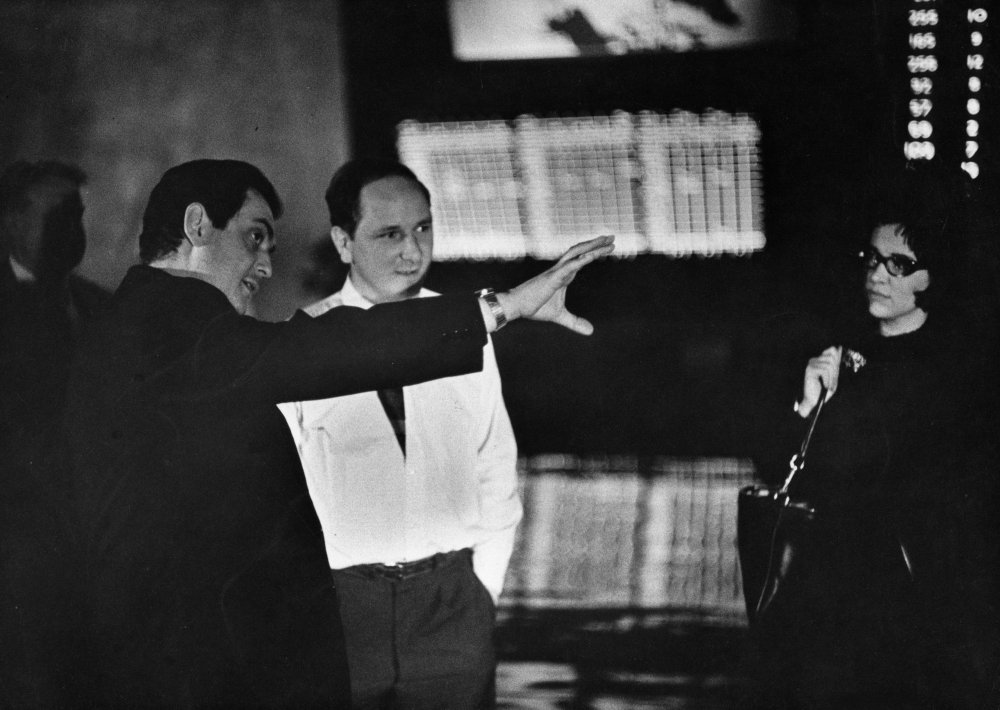
Stanley Kubrick, Kelvin Pike and Christiane Kubrick on the set of Dr. Dr. Strangelove or: How I Learned to Stop Worrying and Love the Bomb (1963)
Katharina: He loved the latest information technology. He was a big gadget fan. We were always playing with the latest gadgets. We’d sometimes get them for Christmas, all of us get the same thing, and we’d say, “Gee Dad, what do I do with this?” So he loved being able to call people and say, ‘‘What’s the latest? What’s the best? What’s the next thing coming through? What do you visualise happening in ten years’ time?” He knew an extraordinary amount of people and when we were children we had writers and scientists and actors and zoologists visiting Stanley. So we were exposed to all these interesting people.
Your problem now is how to adjust the myth before it sets in concrete.
Anya: Possibly we’re not going to be able to adjust it all that much.
Christiane: It’s extremely difficult for us to get rid of it for the same reason that wives can’t be witnesses: they’re considered to be prejudiced.
Anya: But we can reinterpret certain things. It’s a kind of sloppiness to say that someone who was a perfectionist, which he certainly was, was also an obsessive. There’s a world of difference between those two. Obsessive is a medical condition.
Christiane: I mean, you don’t want a casual brain surgeon, do you?
Anya: There are certain themes – his being a recluse, being an obsessive – that are journalistic exaggerations of his characteristics. Recluse is a word that gets thrown at him in practically every article, and as far as I can work out, ‘recluse’ must be defined as someone who doesn’t talk to journalists. He didn’t speak to journalists but he spoke to everyone else. And those who knew him well and liked him and respected him and respected his wishes didn’t speak to the press about him. So the stories that exist come from people who are in some way disaffected or suffering from a lack of judgement. We figure: let’s get ourselves into the clippings file. For all the fact that people will think, “They would say that wouldn’t they”, at least it will be there, and we do have the advantage that we did know him rather well. If we say nothing, then our silence will be seen as confirmation.
Katharina: Or that we don’t care.
Did the mythology get worse with the internet?
Christiane: Worse and better. There are all of people who said very nice things on the internet, but did you know that Stanley had an imitator who pretended to be him?
How did he feel about that?
Christiane: Very unhappy, because he did get letters from people who said, ‘‘You promised my son a part in a film”, and this guy, Mr Conway – who’s now dead – was seducing little boys with the promise of a part. Nobody likes to get a letter saying: “You buggered my son for a part.” That was very unpleasant. They did a television programme about him. It was quite nauseating. That was one of the prices of your name being famous when your face isn’t known, something that otherwise seemed such an advantage.
Did he always get what he wanted?
Christiane: He got what he wanted because people respected him and because they were allowed to work in a certain way. Actors like to be given time on a film, it’s the one thing you never get, and because he had a small crew, it cost relatively little per day for shooting.
It seems very strange to do this huge preparation, to hire very expensive people and then to say when it comes to the shooting, “Oh well, I’ll do it as quickly as possible.”
How did he get the upper hand with the Hollywood studios?
Christiane: Because he was responsible. The studio knew he wasn’t going to waste their money. In fact they sometimes smiled at how careful he was.
What about rereleasing A Clockwork Orange?
Christiane: It’s up to Warner Bros. We don’t have any say in that.
Anya: It’s not exactly high on the list of things to worry about right now. I would say we haven’t thought about it.
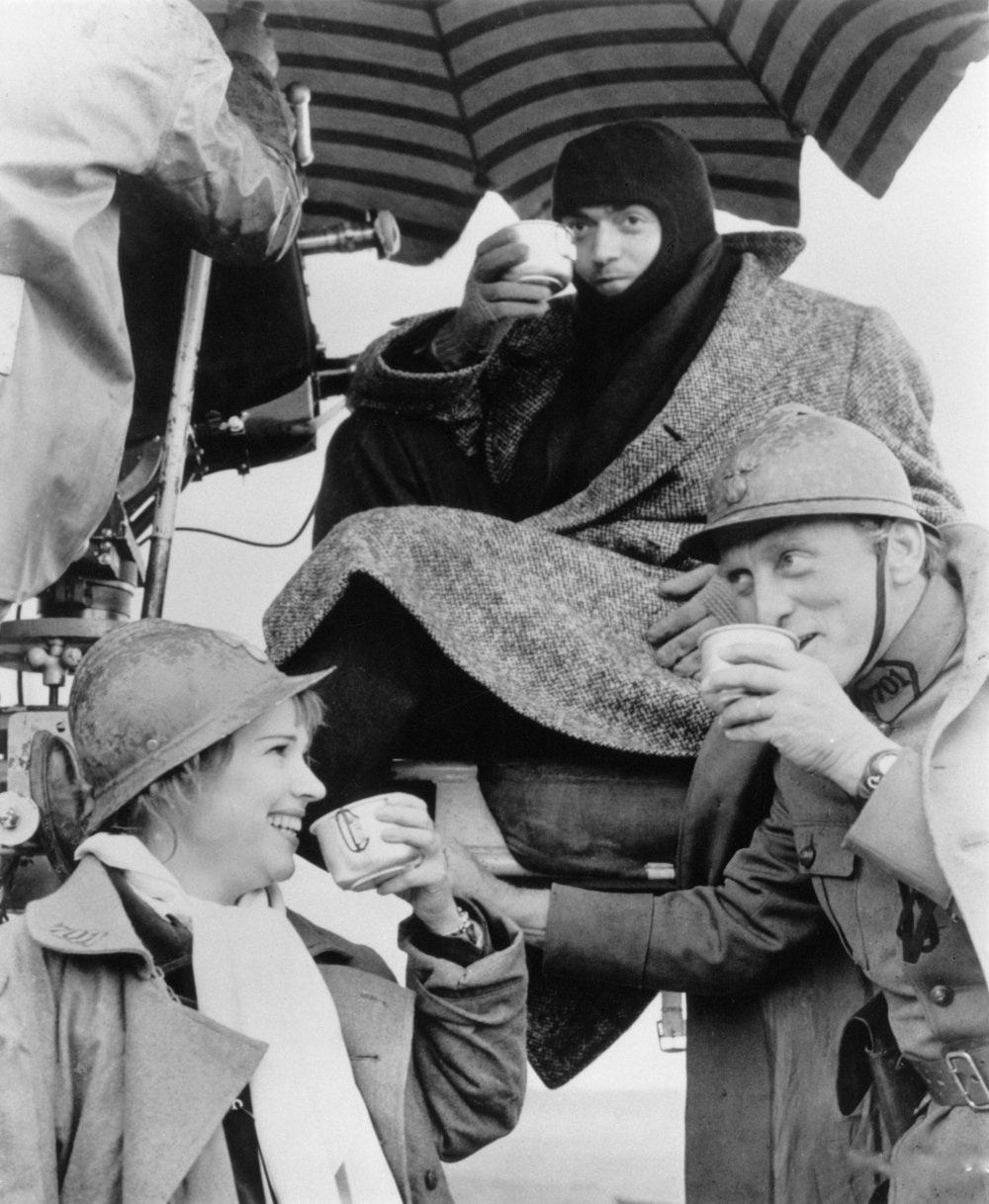
Christiane and Stanley Kubrick with Kirk Douglas (right) on location for Paths of Glory (1957)
Why do you think he was so interested in war as a subject?
Christiane: Stanley was very interested in history. He was a boys’ magazine person. He loved knowing in enormous detail about military things, and I find the news very boring without his comment on everything. This is true of more than just war stories. He would love to have made a film about Napoleon. He wanted to make a film about Nazi Germany. He loved to see any dumb film with a fight between aeroplanes. On one of his last evenings, there was one of these on television. He didn’t want the plot, he just wanted to see if there was a good fight between planes.
Anya: I feel almost embarrassed to say it, but war brings situations that expose the essence of someone’s personality. What the driving forces are.
Christiane: He would cringe if he could hear us talking about this. He considered us unsuitable, because we knew so little about it. While my opinions were sensible and I was of course boringly correct as to the moral end of war – and he agreed with me – it was still no fun talking to me about it.
Anya: He liked talking war and politics with my husband, provoking Jonathan as a dinner-table sport!
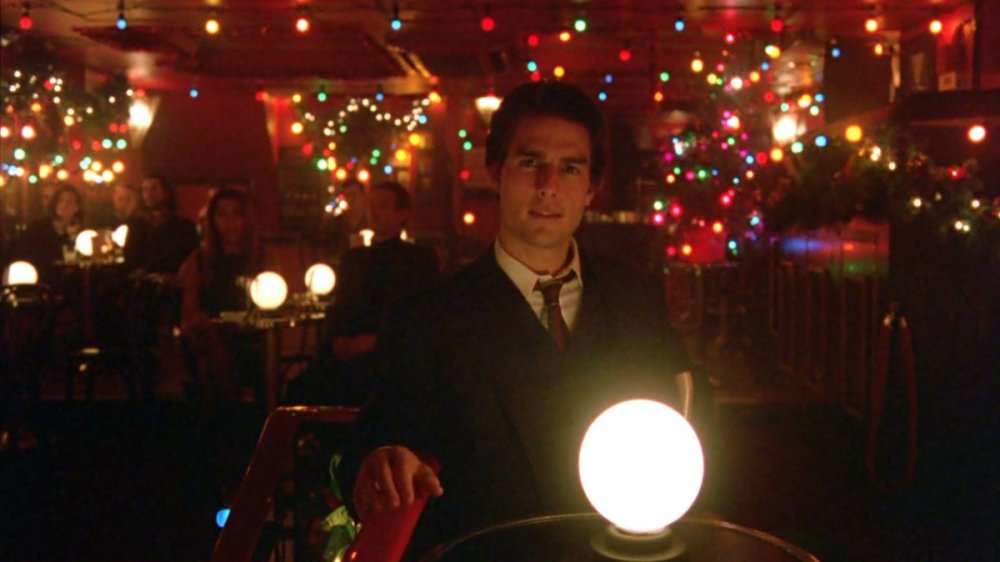
Eyes Wide Shut (1999)
Christiane, in Time magazine you are quoted as being “allergic to psychological conversations”.
Christiane: Clearly I’ve talked too much. What I meant is that when Stanley first read Dream Story, I was familiar with Schnitzler’s plays. There was in the 50s a reaction in Europe against the American preoccupation with psychoanalysis. I shared this reaction, and when I came to America I was astonished that so many people were in analysis and spoke so freely about things that Europeans crossed their legs about. I met a great many Americans then, and I thought that this glorious, guilt-free, self-loving new person who would walk out of the analyst’s office could have done with a bit more guilt. I thought, “Use your conscience to good purpose, don’t whinge over everything.” So with this very old-fashioned attitude I said, “I don’t want to read Schnitzler. That’s moisture-seeking stuff. Forget it.”
So at the time we talked about this book Stanley was very interested and I didn’t want him to be. Then Terry Southern gave him A Clockwork Orange, and I read it and I said, “Forget Schnitzler, read this.” He jumped to that one immediately and Schnitzler was forgotten for a while. But he kept coming back to it.
By the time he was an old man he was in a far better position to make a film about the ultimate topic. It’s good that it took so long. It was wrong of me to discourage anyone in artistic matters, but we were married and you do say these things. I just went with the fashion in thinking Schnitzler was dull Viennese stuff. But in the nature of this story is contained all that goes on between men and women, so if l didn’t like it, why didn’t I like it? It became a joke when I said, “Now, I don’t mind.” “Why don’t you mind now?” I’m very sad I didn’t see the finished film before he died, because he was really looking forward to showing it to me.
It was finished, then?
Christiane: Absolutely finished. There was a piece of music which he had chosen – and we had talked a great deal about what music it was going to be – and I said, “I want to see it now”, and he said, “No, let me put the music in so you can see it with, because I want you to tell me whether it should be in there.” So it was a question of timing. And then he died.
☞ ‘When you hold a mirror to society it rebels’: Katharina Kubrick on Eyes Wide Shut
How was his health in the last days?
Christiane: Fine, but he was very tired. But anybody would be who had worked such long hours. He was 70, so to see him pale and tired seemed understandable. And he was looking forward to taking a rest. Nobody could have known: the heart attack was so massive, nobody could have done anything.
Do you think he had any idea that this might be his last movie?
Christiane: No, quite the opposite.
Katharina: He was looking forward to doing AI. He was very excited about it. There was a lot of stuff already finished and ready to go.
Christiane: He had also become really interested in all the new computer stuff. He had a lot of conversations with Steven Spielberg about what he could do.
The biographies describe him as a fatalist. What were his views about death?
Christiane: We often talked about what a fatalist is, since you can’t escape being one. He didn’t want to die at all, though he wasn’t any more afraid than anyone else. But he wasn’t religious. Like most of us, he would have liked to believe in something. He thought about it a lot.
He was very careless with his health, though. As a doctor’s son, he assumed that he knew about medicine and I often disagreed with his medical ideas. He was afraid of doctors – that comes from being a doctor’s son. He dosed himself and he never really rested when he should have done. He wasn’t feeling ill, just very tired.
Many heart-attack victims are just like that. Such people don’t think, “I’m pushing myself.” It comes naturally with that character. He was very much an optimist. He always thought a job that took two days could be done in two hours if only he put his mind to it. He would start the longest and most difficult jobs with this optimism and say, “Oh, it won’t take long.” He never learned the lesson that it does.
-
The 100 Greatest Films of All Time 2012
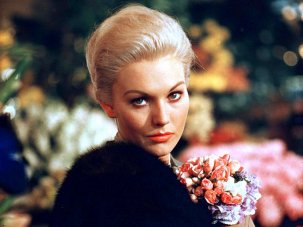
In our biggest ever film critics’ poll, the list of best movies ever made has a new top film, ending the 50-year reign of Citizen Kane.
Wednesday 1 August 2012
-
The Digital Edition and Archive quick link
Log in here to your digital edition and archive subscription, take a look at the packages on offer and buy a subscription.




